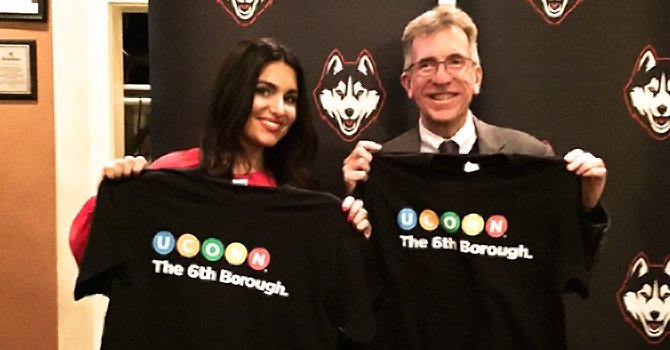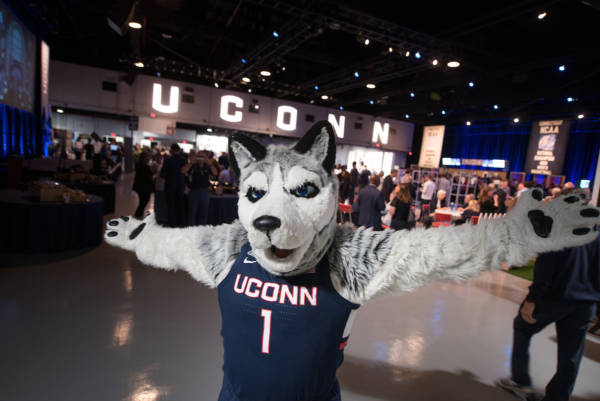The Worldwide Leaders in Storrs

What’s it like to work at ESPN? Two UConn alumni headlined a recent event we held in Hartford and gave the inside scoop on their careers in sports entertainment—and how to land a job in the industry’s premier sports network.
So what do you do at ESPN, anyway?
Mike Soltys ’81 (CLAS) is the vice president for U.S. network communications at ESPN—and can also say he was the network’s first intern. “I was a senior at UConn, communications major, required to have an internship, and I had a chance meeting with Bill Rasmussen, ESPN’s founder, near the Field House in Storrs when I was looking for one,” he said. “And I was familiar with ESPN—they’d been doing a lot of events. I pitched Bill on hiring me by saying the magic words: ‘I will work for free.’ And he said great, you start next week. And they haven’t gotten rid of me since.”
Molly Qerim ’06 (CLAS) is currently an anchor of ESPN’s First Take, a morning sports talk show, along with Stephen A. Smith and Skip Bayless. She’s also a contributor to ESPN2/ESPN Radio morning program Mike and Mike. Molly previously worked with the CBS Sports Network, ESPN Live, and ESPN Mobile. “My first job was with ESPN Mobile, and I was one of the first broadcasters—they were looking for young talent. The technology would go all the way to Seattle, would take hours to buffer, and look where we are now,” she said.
What was the appeal of working at a start-up sports network?
Mike: “I was a big sports fan—and this is a quaint, odd notion, but at that point, sports was on the weekends. With the exception of Monday Night Football and the Olympics, it was not on during the week at all. And we were out there providing sports 24 hours a day. So for my first couple of years on the job I talked to writers around the country, and I had to tell them that we didn’t expect you to watch 24 hours a day; it was available 24 hours a day. That seems like a pretty basic concept, but it was a hard thing to get through to people’s heads. And everyone who was working on it believed it was going to succeed, but there was a tremendous amount of skepticism the first five or six years.”
How did UConn help you start your career?
Molly: “I majored in communications and minored in business administration, and my professors had preached the importance of internships. So while I was a student at UConn, three nights a week I commuted to New York City and I was a production intern for Conan O’Brien. I interned for Conan, CBS Radio, also for ESPN’s sales department.
“The other thing that directed me toward a love for sports were my parents, who went to UConn. They were season ticket holders, so I grew up going to basketball games. My sister also went to UConn. Seeing the power of sports in terms of bringing people together, the healthy competition, what it stands for—I knew I wanted to get into media, but I think being at UConn created the focus on sports, rather than news or entertainment. And I happened to be from a small state with this place called ESPN. So it worked out.”
Mike: “A lot of people don’t know that UConn played a pretty big role in the launch of ESPN. When Bill Rasmussen got fired by the Whalers as its PR director, his idea was to show the Whalers and UConn in the state of Connecticut. He got a deal to do a tremendous amount of UConn sports in the ‘70s and ‘80s, so UConn got tremendous exposure there.
“And of course that was followed with the launch of the Big East. Ratings we could get for Big Monday were greater than any college basketball ratings that we’d get today. And UConn first struggled in the Big East, but over time obviously did well. We also got involved in doing the entire NCAA women’s tournament starting in 1996, one year after the first UConn women’s championship, and we were there for the nine that followed. So UConn has a pretty good history between the university and ESPN.”
Molly, who’s easier to get along with: Skip or Stephen A.?
Molly: “Skip and Stephen A. are two of the best in the business. They’re dynamic, two different personalities, and we have so much fun. And I love the topics we’re able to cover. We don’t shy away from certain controversial issues—which could give Mike some headaches here.
“It’ll sound like I’m giving you a politically correct answer, but they’re both so different. I try to think of myself as Switzerland. They really are household names, big personalities, and the way that they have embraced me in terms of their patience, in making rookie mistakes and helping me grow—I really have so much respect for them.”
OK, so which one’s the bigger UConn fan?
Molly: “I’m going to go with Stephen A. I think he has a relationship with Kevin Ollie. Skip would be more Oklahoma.”
What’s it like being a woman in sports media, a traditionally male-dominated industry?
Molly: “In terms of working with males, it’s helped shaped me a lot in a business sense, in terms of how I deal with things. I think in my particular role, you’re constantly being criticized. And what they’ve taught me is to be resilient, and to let it roll off your back.
“The most important thing for females who want to break into the industry is internships, no matter what they are. Even if the tasks seem silly, give it your all—no one is going to trust you with more responsibility until you do those things well. As a female in sports, right away people are going to assume that because you haven’t played a sport, you don’t have the credibility of your male counterparts. So do your homework, do your research—I know a lot of my female colleagues hold themselves to a higher standard. And take advantage of the opportunities and connections presented to you.”
What advice would you give to those looking to get into sports media?
Mike: “For people in college, I’d say the internships and lots of them. It doesn’t have to be a high-profile situation, as long as the work is of value and you’re meeting people who can help you open some doors. It’s extremely hard to get a job right out of college, especially at a place like ESPN. But those who do have done the internships. Molly: “I would reach out to any contacts you have with your resume and cover letter. If there’s a career fair, if there are events like this—it’s a relationship business, and it’s so competitive right now. I don’t think the initial job will be your dream job, but you can meet new contacts and get great experience. All of my previous jobs have helped me get the experience I needed for the next position.”
What does UConn mean to you?
Mike: “I’ve been affiliated in some way with the university my entire life. My father worked at UConn, and I’m a rare Storrs native. I went to UConn, met my wife at UConn, and had four kids, three of whom went to UConn—the fourth is waiting to hear if he got in. We’re season ticket holders for basketball and football. I’m mentoring in the College of Liberal Arts and Sciences. The student I mentor is wonderful. She plays for the softball team—I saw her in [UConn Magazine] recently. We all bond over great wins and championships.”
Molly: “UConn’s home. So much of my childhood—my father was a ticket holder for men’s and women’s basketball. That was a lot of my identity. My sister, Alicia Bowman, was just awarded Principal of the Year for the State of Connecticut. She has three degrees from there. I’m so proud that I went to UConn. There’s something about the people. It’s real, authentic, there’s a connectedness. Going to events like this, meeting all of you. It’s just a huge part of who I am and I wouldn’t be here now if it weren’t for UConn.”
Missed this event? We’ve got others! Take a look at our calendar.
